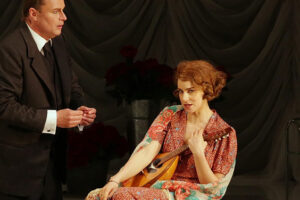

A very smart if rather scruffy way of presenting a problematic work and in particular addressing some of the (until recently) unquestioned assumptions inherent in the opera, the greatest of which, surprisingly, is not the clash of values between European and Levantine cultures but rather the status of woman as either victim or rescuee in relationship to nefarious or heroic men. It seems to be Bieito’s position that being rescued places a woman in as passive a position as victimization and that, in an emotional sense, there is very little real difference between the two states.
Briefly, the action takes place in the present in a large Western or Westernized city. Built into the proscenium arch are video screens showing slow-motion film of a woman putting on makeup, polishing her nails and otherwise getting dressed up; lower (at stage levels) are picture windows with half-dressed women posed provoctively. The stage proper includes a number of transparent glass booths with retro sexy advertising masking one wall; inside these cubicles at various times sex workers ply their trades. There’s also a transparent stall in which Osmin strips down and showers after having had sex with one of the women during Belmonte’s first solo. He later mocks Belmonte by singing “Das ist des Bassa Selim Haus” while jumping up and down nude on the bed as his partner laughs.
And so it turns out that Selim is a pimp running a sort of sex club/bordello, and he is literally holding Konstanze captive leashed and in a small cage. (He pushes the cage onstage during the Janissary chorus, in this context a rabble of pleasure seekers disco-dancing with kitschy light-up red valentine hearts. The cage is covered by a cloth until Selim casually reveals her there; that’s a shocking moment.)
Pedrillo is a janitor/custodian in the club, cleaning out the cubicles and supplying clean towels, and Blonde is apparently turning tricks.
In order to get Belmonte in past security, Pedrillo dresses him in drag including a sequinned minidress; it’s not immediately clear whether he’s supposed be taken for a real woman or customer of the brothel who’s into crossdressing. Anyway, the two tenors do an admirable and well-rehearsed shared task of Belmonte singing “O wie ängstlich, o wie feurig” while Pedrillo dresses him in thigh-high pleather boots.
I should mention that there are “news ticker” type LED displays in various places around the set that quote lines from the libretto related to torture, specifically Selim’s famous threat of “Martern aller Arten.” In this production, instead of merely alluding to these “tortures of every kind,” Selim offers an object lesson, tying Konstanze to a chair and forcing her to watch as Selim systematically slashes one of the prostitutes to death.
The advantages of this radical approach, it seemed to me, were a) to motivate the ever more hysterical outbursts of coloratura from Konstanze (instead of leaving the high notes and roulades as vocal display) and b) to establish the brutalized quality of Konstanze’s existence as captive, so that when Selim murmurs a few comforting but authoritative words to her after all the bloodshed, she follows him unquestioningly from the stage.
So, a few more bits. Since in this version Osmin is obviously not an observant Muslim, his line about how naughty Pedrillo is to try to get him drunk is played as a gag, and the ensuing drinking song is performed while they play what is the most macho drinking game imaginable: Osmin closes his eyes and shoots at Pedrillo, and each time he misses he has to take a shot. (The game ends with Pedrillo shot in the knee, and he spends the rest of the show limping with a red-stained bandage on his leg.)
The two big point are that the reunion between the four lovers at the end of the ssecond act is extremely tense and confused, with the men alternating between being revolted at the sexual abuse the women have suffered and being attracted to them to the point of trying to force sex upon them. The impression I got was that they finally settled on an uneasy alliance based on mutual self-interest: they all just wanted to escape.
The third act is done as a revenge fantasy a la Tarantino, with Belmonte and Pedrillo shooting up the whole brothel, killing sex workers and customers alike: the bloody bodies litter the stage until the end of the show. Selim manages to capture Belmonte and Konstanze, then leaves them helplessly singing their duet as he retires upstage to towel off and change into a fresh shirt and suit.
He returns in time for the famous “forgiveness” scene, which is subverted when he comes right to the brink of killing the terrified Belmonte, then hands the gun to Konstanze and murmurs, “Ich liebe dich” over and over until she shoots him.
And now, with only the four lovers and the dazed Osmin left alive, they sing in chorus
Wer so viel Huld vergessen kann,
Den seh’ man mit Verachtung an!
… words that take on a sinister and disturbing meaning in this context, i.e., thanking a criminal for letting himself be murdered.
Osmin’s interruption of the jubilation is (I think) carefully played for comedy, with the bass doing stereotypical jumping up and down “rage”… until his last words, when Pedrillo calmly shoots him dead.
And at this point, we get the joyous (gloating?) final verse of the vaudeville:
Nichts ist so häßlich als die Rache;
Hingegen menschlich gütig sein,
Und ohne Eigennutz verzeihn,
Ist nur der großen Seelen Sache!
And then Bieito changes the ending of the opera, though the text still makes perfect sense in context. The partying chorus return, hail Belmonte as their new leader (in other words, the beneficiary of Selim’s criminal empire) and he preens in their praise. On the very final note of the opera, Konstanze shoves a gun in her mouth and fires, unable to face another round of abuse.
There’s a lot more to talk about, but I’ll just say that nothing here struck me as gratuitous and everything was indeed thought out carefully with great respect for the meaning of the text and the music. I’ll have more to say as the discussion develops.
























Comments